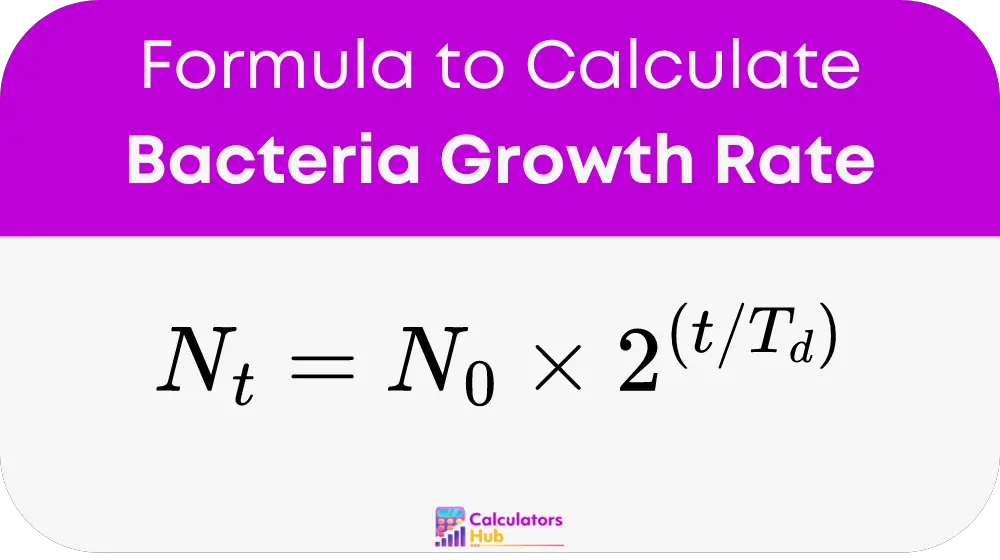The Bacteria Growth Rate Calculator serves as a convenient method to predict the proliferation of bacterial populations. Whether in a laboratory setting or studying microbial growth in natural environments, understanding bacterial growth rates is crucial for various fields, including microbiology, environmental science, and food safety.
Formula of Bacteria Growth Rate Calculator
The formula for calculating bacteria growth rate depends on the specific conditions of the growth. However, a common formula used to describe bacterial growth in ideal conditions (exponential growth) is the exponential growth equation:

where:
Ntis the final number of bacteria,N0is the initial number of bacteria,tis the time elapsed,Tdis the doubling time (the time it takes for the population to double in size).
In this formula, the growth rate is not explicitly given but can be calculated indirectly. The doubling time can be determined from the growth rate using the formula:
T_d = ln(2) / r
where:
ris the growth rate (per unit time).
This formula assumes that the growth rate is constant and that the environment supports unlimited growth.
General Terms Table
Here are some general terms related to bacterial growth that people commonly search for:
| Term | Description |
|---|---|
| Bacterial Colony | A visible cluster of bacteria growing on a surface. |
| Lag Phase | The initial phase of slow growth when bacteria adapt to new conditions. |
| Logarithmic Phase | The phase of rapid exponential growth in bacterial population. |
| Stationary Phase | The phase where growth rate stabilizes due to limited resources or waste buildup. |
| Decline (Death) Phase | The phase where bacterial population decreases due to resource depletion or toxicity. |
This table provides a quick reference guide for individuals seeking to understand bacterial growth dynamics.
Example of Bacteria Growth Rate Calculator
Let’s consider an example to illustrate the application of the Bacteria Growth Rate Calculator:
Suppose we have an initial bacterial population (N_0) of 1000 bacteria, and it doubles every 30 minutes (T_d = 30 minutes). After 3 hours (t = 180 minutes), we want to calculate the final population (N_t).
Using the formula:
N_t = N_0 * 2^(t / T_d)
Substituting the values:
N_t = 1000 * 2^(180 / 30) = 1000 * 64
= 64000
So, after 3 hours, the bacterial population would be approximately 64,000.
Most Common FAQs
Bacterial growth rates are influence by various factors such as temperature, nutrient availability, pH levels, and oxygen concentration.
In ideal conditions with unlimited resources, bacterial growth follows exponential growth. However, factors like limited resources or toxic environments can lead to different growth patterns.
Doubling time (T_d) can be calculated using the formula: T_d = ln(2) / r, where r is the growth rate per unit time.
Yes, bacterial growth can be controlled through measures such as temperature control, proper sanitation, limiting nutrient availability, and use of antimicrobial agents.